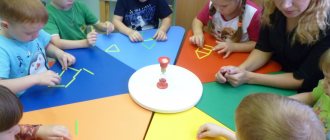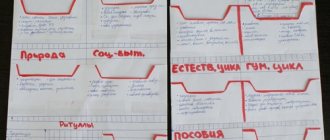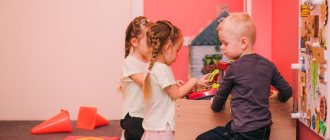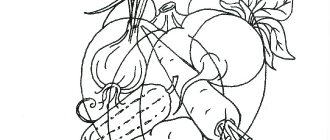Game forms are a universal means of development for preschool children. They contribute to the formation of cognitive processes and the development of the child’s personality. This article provides didactic exercises and games to develop attention in preschoolers. How we develop a child’s attention in preschool age determines how quickly the arbitrariness of this process is formed, and, consequently, the child’s preparedness for school.
Games for younger preschoolers to develop attention
Children aged 3 to 4 years old still have difficulty focusing on speech and verbal exercises. Therefore, in the development of attention it is necessary to use visual perception. It should also be taken into account that the method of cognition in younger preschoolers is visual and effective thinking. Children at this age can look at pictures, repeat actions, and compare objects. These are the games that are suitable for them to train their attention.
- Build like me! Take two sets of cubes of different colors (no more than 5). Sit next to your baby, taking one set for yourself and placing the second one in front of your child. Build a simple structure from your three or four cubes. Invite your child to build the same. If the preschooler succeeded, but without taking into account color, draw his attention to this fact. After praising your child, encourage him to do it again. As the child gets better at it, complicate the designs and add new geometric shapes (cone, cylinder...)
- What do dolls lack? Place three dolls in a row. Tell them what they are going to eat. Place a plate in front of two dolls, a spoon for two more, and also place two cups. Arrange everything so that each doll has two items. There should be utensils on the side, both necessary and unnecessary. Ask the child what is missing from the first doll, the second... Let the child complete the “setting”.
- What have you lost? Draw a simple plot picture: a house, a tree, the sun, a cloud, etc. On a separate sheet of paper, roughly repeat the basis of the drawing from the three main elements. Next, ask your child what else needs to be added, comparing both drawings.
Rules for training voluntary attention
Voluntary attention is a special type; its implementation requires goal setting and volitional efforts. In preschool children, neither one nor the other has yet been developed. Parents should develop all this by teaching their preschoolers to be independent. To properly work on developing voluntary attention at home, it is necessary to follow certain rules:
- Consistency and systematicity of classes.
- Working on voluntariness is difficult for young children. To make complex activities attractive to children, you need to start with easy-to-perform exercises, gradually moving on to more complex ones.
- Training to develop voluntary attention is carried out in two positions:
- Special exercises for the basic properties of attention.
- Special tasks for developing attentiveness and eliminating attention depletion.
Attention games for middle preschool children
A five-year-old child knows and can do much more than a younger preschooler. He has a vocabulary of 2 thousand words, understands quantitative and qualitative relationships (more - less, stronger - weaker), and perceives verbal instructions. Accordingly, the range of games and attention exercises for preschoolers is expanding.
Exercises based on visual cues
- Lunch for Matryoshkas . Prepare a set of pyramid rings and a set of sticks of different sizes. They will serve as cutlery for the nesting dolls. Set your child the task of choosing a “plate” and “spoon” for each nesting doll in accordance with its height.
- Each item has its place . Place 6 or 8 small items in two rows. Let the preschooler carefully look at what objects are and where they are. The child turns away and counts to three. During this time, the adult swaps 2-4 objects. The child will have to return everything to its place again.
- Hostess . Mix beans, peas and buckwheat in one bowl (a spoonful of each ingredient). The child will have to sort the contents. In the same way, you can mix round, square and triangular buttons, so that the preschooler can then arrange them into three piles. In addition to developing attention, this exercise helps train fine motor skills.
- Attentive buyer. Prepare several drawings consisting of only lines. But the lines are not chaotic. They are the outlines of images of vegetables and fruits. Intrigue your preschooler by the fact that he came to a grocery store that does not have display cases. The seller will only sell those fruits and vegetables that the child finds in the picture. Example drawing:
Games for auditory attention for preschoolers
- Name day. Tell your child that it is the doll’s birthday, and guests will soon come to congratulate the birthday girl. Choose 5-6 toys (these are the guests), giving each one a name. The child seats the guests around a makeshift table and treats everyone to tea, addressing everyone by name.
- Listen to the claps! Agree with the children that they will take a certain pose when they hear the claps. 1 clap – transform into a frog by squatting and touching the floor with your hands; 2 claps – transformation into a stork standing on one leg; 3 claps – free walking. Children move freely around the room and follow commands, listening to the claps.
conclusions
In order for a child to absorb information well and be able to study successfully at school, it is necessary to devote enough time to developing his attention. When choosing games and exercises for your child, focus on his age, interests and individual characteristics. If the child does not want to complete a task or is very tired, you need to try to understand what is causing this: uninteresting material, difficulty of the task, bad mood or well-being. With the right approach, all cognitive processes of preschoolers, including attention, develop very quickly.
Exercises to develop attention in older preschoolers
Games for older preschoolers to develop attention are more complex. They require concentration, concentration, and also contribute to the formation of knowledge and skills necessary for entering school. Find out what your child should know by 1st grade.
Games actively involve memory and verbal logical thinking. In addition, they often contain a competitive condition, according to which the most inattentive are eliminated from the game. Older children are encouraged by such exercises, and they then perform them with interest without the participation of an adult.
- Look around. This game can be played anywhere. It is enough to decide what you need to see in your immediate environment. For example, on the way to kindergarten or to the store, name everything that has a round shape. Or focus on the perception of color and name yellow and green objects.
- Remember the pictures. Pre-prepared cards with the image of one object are used. Pictures of 10-12 pieces are laid out in a row, and the preschooler looks at them for 1-2 minutes. Then the cards are removed, and the child lists all the images that he remembers. The exercise also develops operational visual memory.
- Fish-bird-beast. A group game in which one person is the leader. The presenter, in the form of a counting rhyme, points to each participant and says: “fish-bird-beast-fish...”. This chain is repeated as much as the leader considers necessary. He can stop at any of these words and, pointing at the participant, become silent. This means that the participant must name a specific type of fish, bird or animal (depending on the last word). Names cannot be reused. If the answer is correct, the game continues with the same lineup. If a player gives an incorrect answer, he is eliminated from the game. Waiting for an answer is limited to counting one-two-three.
- Repeat and complete. It is better that 4-7 people take part in the game. The first participant names the word, the second repeats the word he heard and adds his own. The third one repeats the words that were spoken and completes the chain with his own word. The one who makes a mistake is out of the game.
- Listen - do it. Exercise helps develop attention and memory. The adult names a chain of actions without demonstrating them. He speaks slowly the first time, and repeats the second time at a normal pace. After this, the children reproduce the movements in the same order as listed by the presenter. Some examples of actions:
- Raise your right hand in front of you, raise your left hand up, lower both hands.
- Turn your head to the right, raise your left arm to the side, turn your head straight, raise your right arm to the side, lower your arms.
- Raise your left leg, clap your hands, lower your leg, jump.
This game is especially interesting for children if several people take part. Even the most absent-minded children try to listen and carry out all the actions.
The games presented in this article can be used for activities with one child or with a group of children. It’s great if an adult acts not only as an organizer, but also as a partner. Moreover, many exercises do not require special conditions. You can play with your child to benefit his attention during the most ordinary walk in the park.
When selecting exercises to develop attention in preschoolers, adhere to the principles of moving from simple to complex and the attractiveness of tasks. Also take into account the characteristics of the child’s temperament that affect the speed of switching attention.
Mindfulness exercises for children 4-5 years old
Children of this age are able to concentrate on a task for 20 minutes. The amount of attention increases, the baby learns to distribute it correctly. Role-playing games, creative activities (drawing, modeling, appliqué), and performing household chores help develop attention. A 4-5 year old child can already follow the rules quite well and remember them, due to this the voluntariness of all mental processes, including attention, develops. Here are games that will help your baby become more attentive:
- "4 Elements". Give your child instructions: each of the 4 elements has its own movement. When you call the word, the baby must perform the correct movement. For example, water – arms out to the side, earth – arms down, air – arms up, fire – jump. You can come up with your own version of the game that will interest your child.
- “Heard - clap.” Call out different words and have your child listen carefully and clap their hands when they hear a word that belongs to a pre-selected category (such as animals or vegetables).
- Labyrinths. This task, beloved by all children, perfectly develops visual attention and thinking.
- "Confusion." The child must name who is depicted in the picture.
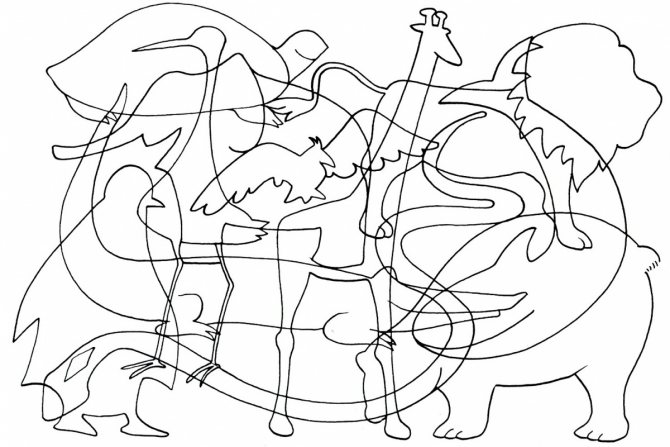
To avoid absent-mindedness and other attention disorders, do not overload your baby with too complex tasks.
Properties of attention
There are 6 properties in total. And difficulties with each of them bring problems to the activities of boys and girls:
- Attention span. The small volume does not allow you to concentrate on two or more objects at once, or “keep” them in your head.
- Concentration and stability. There are difficulties with them if your child is easily distracted by all sorts of nonsense. That is, he is not able to do anything with concentration.
- Selectivity - it is extremely important to choose the most important thing (subject) and focus on it.
- Distribution of attention - it is impossible to distribute efforts on 2 things at once.
- Switchability - the ability to easily switch between tasks.
Your task is to understand where your son (daughter) is having difficulties. What is difficult - concentration, listening comprehension, distribution, selectivity?
Knowing this for sure, you can easily select the most necessary and appropriate exercises and games for him to develop the desired quality of attention.
Tips for parents
By completing interesting, playful, interactive tasks, the child will find differences between drawings, compare animals with their silhouettes, connect halves of figures and objects, go through labyrinths, navigate on a sheet of paper according to a plan, draw according to instructions, etc.
Any child will like high-quality illustrations, and he will complete tasks with pleasure. By working with tasks, a preschooler will not only spend his leisure time interestingly and usefully, but will also become more attentive and smarter.
It is very important to develop attention from early childhood, so that already in elementary school the child does not experience difficulties in learning to write, read, count, etc.
Future first-graders need not so much the quantitative accumulation of knowledge as their qualitative aspects: the ability to perform simple logical actions (generalization, comparison, analysis), argue their thoughts (affirm, refute, reason), independently find ways to solve problems, master techniques of voluntary attention and memory , be able to focus on a task, concentrate on a task , have speech culture skills.
When organizing classes, ensure that your child’s work space and time are properly organized.
- take care of the lighting,
- watch your child's posture,
- Explain the task to your child, even if it seems to you that it should be clear.
- Encourage the desire for independence.
- Praise for successes, don't scold for mistakes!
Attention tasks for children can be combined with other activities: to develop logic, thinking, reading and writing, fine motor skills, and mathematical abilities.
For example, in order for a child to count carefully and consciously, he must associate with each concept of number a certain idea of the number of objects. When calling the number 4, the baby must carefully count 4 objects; count them in order, put them in one group, draw the named number of circles or squares, show “four” on your fingers.



